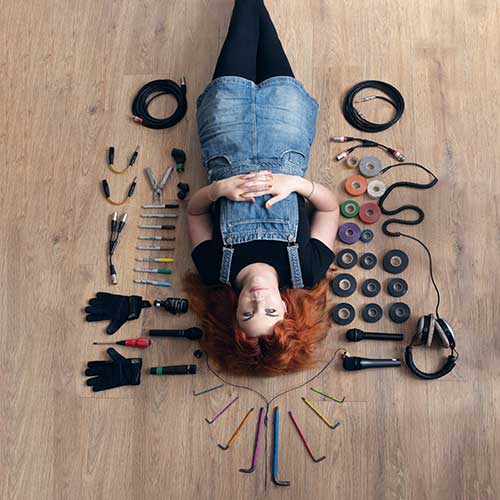Women in Pro Audio: Hannah Brodrick Women in Pro Audio: Hannah Brodrick...
“I love that what I do inspires other people, especially women. If some little girl at her first gig sees me on stage during a changeover one night, and that sets the spark that encourages her to pursue a career in live sound, then that’s undoubtedly the coolest achievement for me.” – Hannah Brodrick
When you go to a live show, do you ever wonder who’s working behind the scenes to make it so magical?
Meet Hannah
For this round of our Women in Pro Audio series, we’d like to introduce you to Hannah Brodrick, a live sound engineer specializing in monitor mixing. “Essentially, I’m a musical switchboard operator. I sit on the side of the stage in the dark, staring at musicians, deciphering facial expressions and cryptic hand signals, and try to make sure they can hear what they are singing or playing and provide them with whatever else they need. At the same time, providing the crew with a means to communicate during soundcheck and show,” Hannah says.
She’s also the Co-Director of Women in Live Music: a fantastic organization that aims to connect and celebrate women across the industry. “We want to inspire those just starting out and try to equalize that gender balance.”
How it all Started
“I studied Music Technology at college and then went on to study Music Technology and Sound Design at University because it was the only thing I found that I really enjoyed. Growing up, I played various musical instruments and even joined a band. But I never had the passion, confidence, or willpower to be a rock star. I was delighted to find an alternative direction to explore my musicality, away from the spotlight.”
Hannah further explains that her degree was very studio-based, “As soon as I discovered music, I knew I wanted to be a part of the industry, but it seemed like such an inaccessible world. Aside from musicians, I only really knew of recording engineers and producers, so for a long time, I pointed myself in the direction of the recording studio. I learned a lot but struggled with confidence; being one of only maybe three or four women in my courses and a lot of the guys boasted about high-tech home studio setups. Plus, many of them were already playing in or working with bands, and I felt like I could never compete.”
After Hannah left University, she spent a couple of years working various unpaid internships for music PR firms, speaker manufacturers, and others of that ilk. “As soon as I was aware of actual jobs in live music and you didn’t need to be able to play instruments to go on tour, that was it for me. Eventually, I got some work experience at a theatre, which led to freelancing for local venues and small production companies around the Southeast. Once I started venturing into the world of live sound, I felt like I needed to go back to education to hone my skills in that field, so I took a three-month intensive live sound training course with Britannia Row. From there, I began working on bigger productions and touring—and well—the rest is history!”
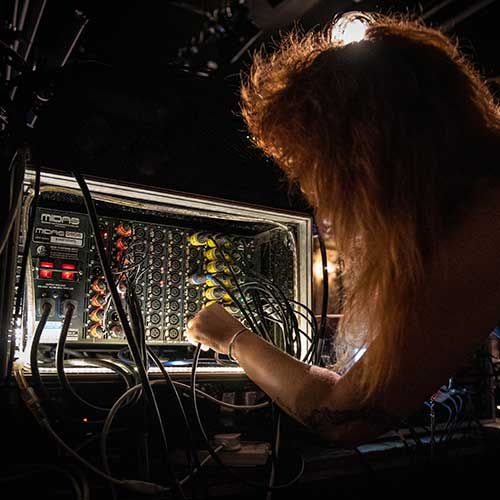
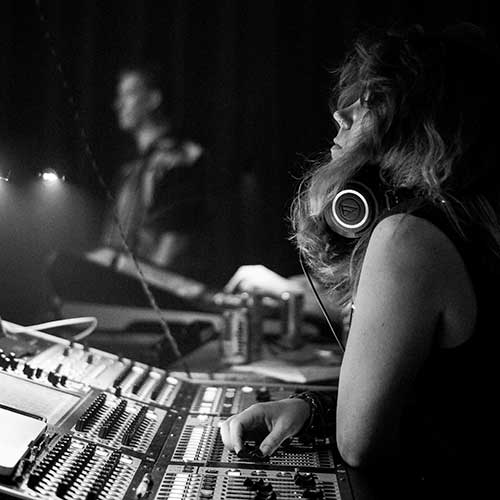
Industry Challenges
Hannah speaks candidly about one of her challenges with the industry, “The biggest challenge with my job has always been my own insecurity, sadly. And I see this in many other women in the industry too. We feel like we don’t belong, so we work harder than everyone else to justify our position, ask for less money than we should, and downplay our achievements. Tours can also be lonely when you are the only woman because, essentially, you are part of a tribe, and to survive, you need to fit in, which is sometimes tricky when you don’t look, sound, or behave like everybody else.”
Hannah also addresses the lack of women in the industry, “It comes from our early experiences in life, witnessing gender roles which are reinforced over and over again. We’re told women are good caregivers and are good at organizational roles, whereas we are told men are good at technical roles and physical jobs. It’s echoed across many industries; why would audio be an exception? I want to think it’s changing, though. The rise of social media over the past 15 years has meant that female role models in the industry who have often been hidden backstage in the dark wings of venues are now visible and contactable. The key is to expose kids early on in life to diverse career options and get society/schools on board with making women in these industries visible. After all, you can’t be what you can’t see.”
Let’s not forget motherhood, Hannah points out, “It’s a job that’s not easy to fit around motherhood when women are still expected to be the primary caregivers. Many women feel like they have to choose between a career in live sound or motherhood, and rarely are both presented as an option. If the industry did more to accept pregnancy/motherhood, we’d definitely retain more of our female workforce.”
Industry Positives
Despite the usual challenges women have in a field where they’re the minority, Hannah brings up the advantages. “Although being a woman has helped me more than hindered me in my career. You’re unusual, so people remember you, and many artists are seeking diverse crews these days, so you get put forward for many opportunities.”
Hannah also gushes about a few tours she’s worked on that have been very positive. “My current role as Monitor Engineer for Florence + The Machine is a total dream. I’m lucky to be a part of a fantastic lovely crew who are all the best at what they do, which in turn, has made me a much better engineer. We recently had two double-sold-out shows at the Hollywood Bowl and Madison Square Garden. It feels great to be part of a tour that has been so successful in times of such uncertainty regarding the industry. Touring the US for three months with them was an unforgettable experience.
“Before this, I was Monitor Engineer for an artist called Dodie, and it was honestly the warmest, most beautiful company. The band and crew were very carefully put together, all similar in age/values, etc. I’m still in touch with all the artists I’ve worked for over the years, and it’s a very personal connection you build. Some people will argue against that being a good thing; that you shouldn’t get too close. But I’d rather have the bad with the good rather than disconnect emotionally from the people and experiences I have on tour.”
Overcoming Challenges
“Whenever I’ve hit a challenge, I talk about it to death with whoever will listen. I’m grateful to have good friends and mentors in the industry who I call on in times of need and who can give me advice and listen to my worries. My partner has the same job as me, so we often support each other emotionally and solve problems together.
“If the challenge happens to be, for example, a piece of kit that I’m unfamiliar with that I have to use on an upcoming show, I’ll make sure I get some time with it to learn it ahead of the gig. Sometimes that means sitting in a warehouse for a day swearing at equipment, but I always try to ensure I’m as prepared as possible for what’s ahead.”
Wishes for Industry Changes
“Touring aside, I would like to see the back of the 12-hour working day that is accepted as a standard for event workers, at least in the UK. If you work 12 hours a day—not including travel—then you don’t have time for a life. Period. Many of us are here because we are incredibly passionate about our jobs, and that’s great. But hours at work, sleep deprivation, and injuries should not be badges of honor. We need to normalize having a life outside of work and practice setting healthy boundaries. I also believe this attitude is the key to avoiding burnout and to sustaining a long career in the live music industry.”
Hannah continues with what she’d like to see in the future with the pro audio industry, “I would also like a better community that shares opportunities and knowledge and builds each other up. Much of my early experiences in the audio industry were people gatekeeping knowledge in the fear presumably that someone might steal their gig, which is a shame. We need to stop seeing each other as competition and start a culture of celebrating each other and our achievements. I think we also need to make pro audio and the events industry—as a whole—more visible. The recent pandemic was a real wake-up call to how hidden away we are, and future governments need to know of our existence should we ever face a situation like that again. This industry should not be forgotten regarding education and funding.”
Advice
Her advice to other women? “Join communities such as Women in Live Music, Soundgirls, etc. And connect yourself with people in the industry. Take any and every opportunity that comes along, and feel free to reach out to people for advice, the worst that could happen is you don’t get a reply, right? I wish I’d been more tenacious starting out. Also, understand that nobody is naturally ‘good’ at any particular role. To be good at something requires passion and a whole lot of time. To quote Malcolm Gladwell, ‘practice isn’t the thing you do once you’re good. It’s the thing you do that makes you good.’ So get those hours in, make mistakes and stick at it! And the best advice that *I* ever received was to label everything. Keep it simple, and always have mints with you!” Hannah says with a wink.
As for critical skills to focus on in the industry, Hannah says, “In my opinion, people skills and emotional intelligence are the most important skills. You can be the best mixing engineer in the world, but if you can’t get along with people and if people don’t connect with you, you won’t get asked to go on tour. I appreciate that this isn’t easy for everyone, but I think the social skills needed for this job are often overlooked. My job is 20% technical ability and 80% emotional understanding/ego management, and I don’t mean that in a bad way. Egos are significant for performers, and they need to be managed carefully. Also, listen without looking. These days we have a whole range of tools that can help us see what’s going on: level meters, spectrum analyzers, compressors, EQ, etc. We often have many screens in front of us that someone looking over our shoulder can judge and shame us for (and they do!), but hearing is subjective, and if it sounds great to you (or the artist if you are doing monitors) then that’s all that matters.”
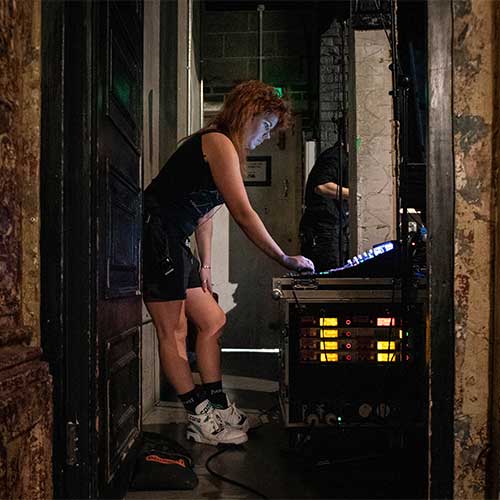
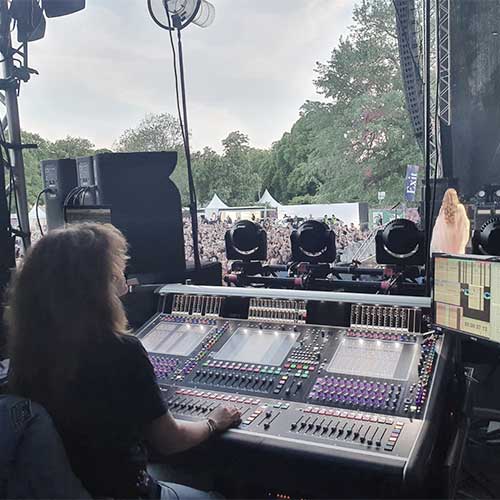
Industry Resources
“I’m active in many Facebook groups centered around the industry and believe human interaction is the best transfer of knowledge. That’s my advice for anything live sound related. The Women in Live Music group, especially, is a great safe space for women to ask questions without fear of judgment. Women can seek advice from others, whether it’s something technical or ‘I’m on tour; can anyone recommend a good nail salon in this city?’ etc. I’m really proud of our supportive community.
“As far as learning material goes well, the Live Sound Reinforcement Handbook has sat unread on my shelf for the past ten years, so I guess it’s about time to admit I’m not the sort of person who enjoys learning by reading. I prefer learning by doing. Workshops and seminars are more of my learning style. Shure has hosted brilliant workshops, and RF Venue does great webinars centered around radio frequency—which is a big part of my job. Going to trade shows such as PLASA or ISE, mucking about on new consoles, and bugging the sales reps with questions also work for me.”
Anecdotes
Hannah recounts one weird situation while on tour and another that elated her: “A long time ago, I was on tour with Noel Gallagher as RF tech when he had this choir with him. My main job was looking after all their in-ear monitors, and one day when I was walking around the venue trying to find the choir’s dressing rooms with my arms full of equipment, I accidentally took a wrong turn and walked into Noel’s dressing room. He was bizarrely standing in the center of this huge room and just slowly turned around and silently stared at me out of the door without saying a word. That was my only interaction with him during the whole tour! I was scared of him after that.”
As for her moment of elation: “One of the first gigs I went to at the tender age of 15 (with my Dad) was a Motörhead show at the Hammersmith Apollo back in 2005, when Saxon and Girlschool supported. I became a huge Saxon fan and saw them many times after that. Over a decade ago, I met them in Germany at a signing, and without any merch to sign, I gave them my trainers—which I wore until they fell apart. I even had a dream where I was asked to do sound for them.
“Well, about a year ago, the dream came true, and I got the call! ‘Hey, our Monitor Engineer is stuck in Germany and can’t make it over for the next two gigs. Can you step in?’ And would you believe it? They were playing Hammersmith Apollo, and Girlschool was supporting! I ended up only doing the Manchester show as their Monitor Engineer, Mehmet, made it back for the London show. I didn’t care, though. I got to do sound for my favorite band for one night, and how many people can honestly say that?”
Her Favorite Things
While the pro audio industry can be rough, it isn’t without its merits, its joys, and the wonderful feeling of accomplishment. Hannah shares her favorite things about what she does.
“My favorite thing about what I do is that I get to be a part of the creative process, even if it’s just a small part. Knowing that your microphone choice made that particular artist’s voice translate in the best way to a crowd of thousands of fans or that the reverb you used on drums perfectly complimented the atmosphere of the gig’s space. To me, a perfect show is when the artist and crowd are lost in their performance and don’t even realize I’m there.”
Hannah thinks for a moment, “I always strive to be the person that 15-year-old me would have thought was cool, and I think I have succeeded. I love that what I do inspires other people, especially women. If some little girl at her first gig sees me on stage during a changeover one night, and that sets the spark that encourages her to pursue a career in live sound, then that’s undoubtedly the coolest achievement for me.”
Then there’s the support: “I’m also very proud that my parents can sometimes attend my gigs. They have supported me all the way, and that’s fantastic,” Hannah concludes.
Hannah’s words show that support and visibility can go a very, very long way.
To get in contact with Hannah, check out her website.
